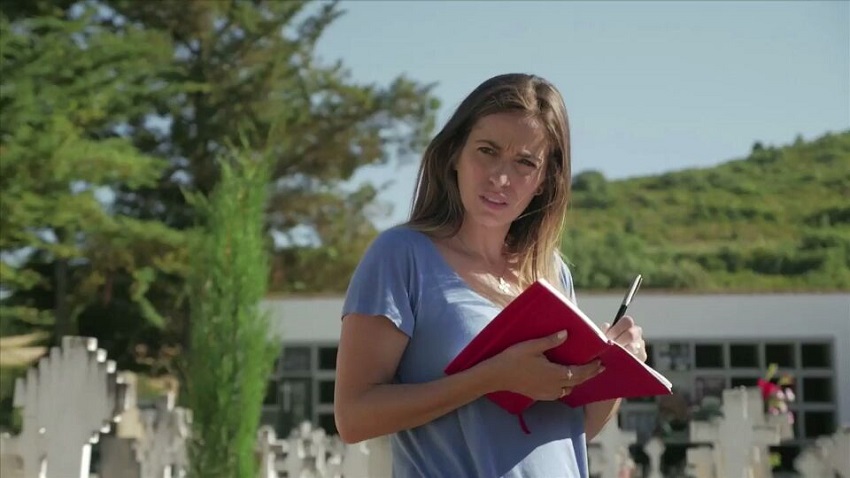Viedma, Argentina. To celebrate the 80th anniversary of the first Basque Government there have been several activities throughout the year with Lehendakari José Antonio Agirre at the center. One that is especially close to the Diaspora is the debut of the documentary Orain 80 urte (80 Years Ago), not only because of its elaboration as a tribute form the perspective of the Diasporara, but also because of its narrator and presenter from Argentina, Rocio Basterra, who was born in Viedma, Rio Negro 36 years ago. A Euskaltzale trained in the Euskara Munduan program sponsored by HABE and FEVA, Basterra is a Basque teacher at the Aberri Etxea Basque Club in Viedma and Patagones, and other clubs in the area, dantzari, She is also a representative of Argentina at international pilota paleta tournaments.
It isn’t difficult to understand why the film’s director, Oier Plaza, asked Rocio to guide the documentary, an experience that Rocio has qualified as “unique,” in her life. Hours before its premiere, EuskalKultura.com interviewed the irakasle from Viedma. She told us how it was recorded and how she is getting ready for her big moment this afternoon.
“The documentary is a tribute that spans the last 80 years of the Basque Government from the perspective of the Diaspora, designed to be shown all over the world. It includes the institutions and the contributions over the years, and how they have lasted until now. I have interviewed very distinguished people and I learned from each one. The documentary begins in Viedma y Patagones, but then moves on to Bilbo, Ondarroa, Donostia, Gasteiz, Caseda...to mention a few, and it arose at the request of the Basque Government, produced by Filmak TV in Germika and was directed by Oier Plaza. I think that it has been a very serious project, very professional, and I have given my all to make the standard,” she said when asked about what will debut at 15:30 Argentina time today.
-How did the producer contact you?
While I was on vacation in Euskal Herria they interviewed me in Berria. It was because of that interview that Oier Plaza, and the producer contacted me. They told me about the project on our first call. Later we had some more meetings to determine if my profile was what they needed.
-Tell us about the experience…
Incredible, unique…to represent the “empire” created by the Basque Government and the people from my humble eyes….it was a huge commitment for me. Also, my own family history came into play, I am the granddaughter of Navarrese immigrants and this was also included in the documentary, it was a huge honor for me. I have so many anecdotes…the shooting lasted all of June and the first week of July, and several times during it I had to make an effort not to cry. I was working…but the whole time my grandfather Modesto and my grandmother Angelica would come to mind, they entirely instilled in me my love for the Basque language and culture and our family.
Those interviewed were not chosen by chance…all were distinguished and in various disciplines, and everyone treated me incredibly; they made me feel like I could do a good interview without being a journalist because I could be moved and simply enjoyed them. As proof of this I have a very special story. I was interviewing Kirmen Uribe, towards the end of the shooting, and because of all of the emotion of everything that I had experienced, I couldn’t speak Basque…I tried, but Kirmen, as well as the producer understood the situation and made me feel comfortable.
Another special moment for me was with the writer Arantzazu Amezaga. She was born in Argentina and lived for many years in Uruguay. That is why she welcomed me to her home with mate…but prepared in a different way than we do it…she filled the kettle with grass! It was like mate tea, prepared like when you drank it as a child…The way she welcomed me was so sweet…and I drank this mate without saying a word.
What has making this documentary left you?
It left me the certainty that even under the worst conditions, you can live with dignity. That with conviction, nothing is impossible…and that “what moves the world is love, and emotions,” Guillermo Dorronsoro, talking about technology, cites these words by Kirmen Uribe.
In 2012, i had my first experience with Basque TV co-hosting the program “Yes We Jai,” on EiTB and I had a great time. I had the opportunity to be me, with my way of being, my failures, successes….Now the challenge was different. An institutional proposal, from the Basque Government, I had to adapt in order to fulfill the image that they required, but also bringing along my own history, my family story that absolutely activates my whole being…what I am…
Debut
“Duela 80 urte,” will debut today at 19:30 (Euskadi time), at an event that will take place at the Principal Theater in Vitoria-Gasteiz and will include a concert by Kepa Junkera. In the Diaspora it can be seen online (here), in Argentina beginning at 15:30. Rocio will watch it in her hometown, at the Aberri Etxea Basque Club along with members, friends and family. “We will watch it eating popcorn and drinking mate, like we do every day, although I still find it incredible to think that it will be me on the screen.”






 Send to a friend
Send to a friend Add comment
Add comment








